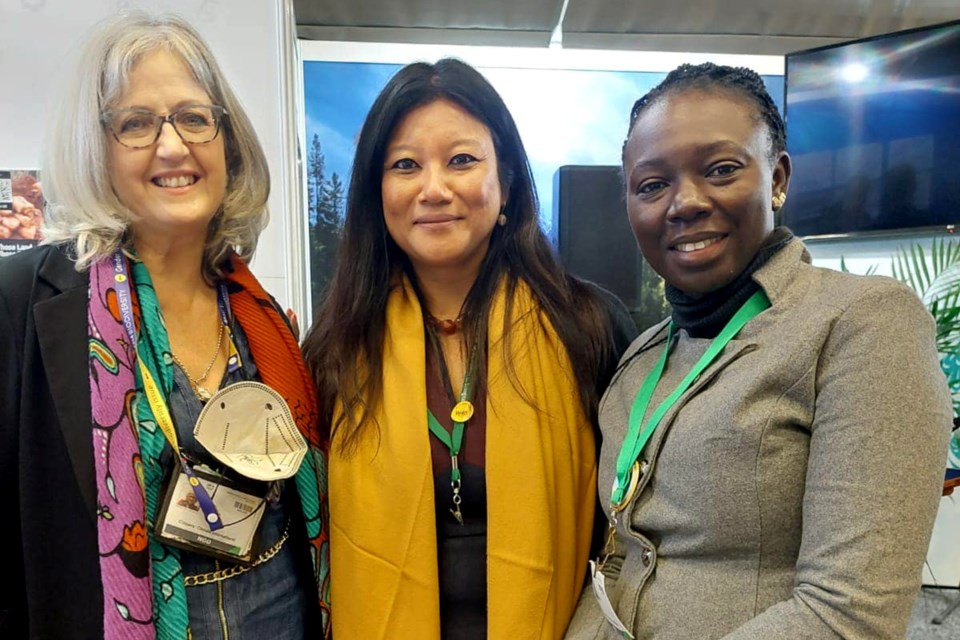Thank you for reading my dispatches from COP 27, the United Nations climate conference, in November.
In December, I was also an observer at the United Nations Convention on Biodiversity conference (COP 15) in Montreal. The outcome was the historical post-2020 Kunming-Montreal Global Biodiversity Framework (GBF).
The GBF sets a new standard for stewardship of nature with "30 by 30": protect 30 per cent of the world’s lands, coastal areas, inland waters, and oceans, by 2030. The GBF is built on four goals and 23 targets.
The reason why the GBF was historical is because both nature rights and human rights were embedded into a UN biodiversity framework for the first time. There are now specific stand alone targets for Indigenous Rights (Target 22) and Women's Rights (Target 23) in the post-2020 GBF. The International Indigenous Forum on Biodiversity, Women 4 Biodiversity and their vast networks made this happen.
There is work yet to be done, though.
For example, financing for biodiversity is not well-defined. Why? Because this is a new type of financing. There are organizations following this new type of financing including Climate and Company, Forest and Finance and the Global Forest Coalition.
Tracking biodiversity protections is underway. There are satellite measurements such as the Data Reporting Tool (DaRT) and Agriculture, Biodiversity and Climate (ABC) and soil measurements via the Food and Agriculture Organization of the United Nations (FAO). What is needed now is capacity building to monitor the impacts of biodiversity policies on the lives of women, local communities and Indigenous peoples.
Alarmingly, I heard stories about the militarization of conservation. I heard horror stories from the Global South. Indigenous peoples are being forcibly removed from their lands to make room for ecotourist resorts for the privileged few. Sadly, there is sometimes state-sanctioned violence involved and data is clear that these ecotourist developments rarely benefit locals.
In Canada we need to watch carefully what is happening in our boreal forest. I learned from the documentary Issue with Tissue that Procter and Gamble is cutting down old growth forests to make toilet paper and how this resource exploitation is tightly linked to violence and violations of the rights of Indigenous people here in the world's largest forest: the boreal. As well, there is an egregious form of greenwashing happening. Wood pellets are being made from trees harvested from BC's old-growth forests to burn in power plants in the United Kingdom.
Internationally, we should all be keeping an eye on both the Taskforce on Nature-related Financial Disclosures and the Belt and Road Initiative in Asia. There is concern they are not considering human rights nor truly protecting nature.
I was happy to learn that communities and movements fighting for environmental and climate justice can find support at Research for the Front Lines. They offer pro bono research time and labour.
Obviously, the GBF is a framework and the UN can't enforce the GBF rules. Our governments must enforce it. We the people have to educate ourselves, demand it and then elect politicians who will abide by it. If our democratic institutions fail us we can sue.
Everyone needs to know that they have rights. Most people don't know who the robber barons are that are stealing their natural resources of air, water, soil, forests, clean food and stable climate. For example, most people don't know that fossil fuels are the No. 1 source of global-warming gases and there has been 30-year disinformation campaign to fool people, funded by the fossil fuel industry.
Just recently, Puerto Rican communities filed a RICO suit (Racketeer Influenced and Corrupt Organizations) to hold the fossil fuel industry accountable for “decades of deception” for the devastation caused by Hurricane Maria in 2017.
Long ago, when most humans were directly dependent on the land and lived in small communities, nature rights and human rights were interconnected. This was a form of "natural law," because if one person or group destroyed nature by polluting waters or overconsuming a natural resource everyone was at risk.
The GBF brings humanity full circle. Natural law has always been with us. Balance is being restored.
Suggested actions:
If you want to learn more about what happened in 2022 at the multilateral institutions and how it can inform your work locally I recommend watching this recent video from Citizens' Climate International.
If you want to get involved directly in building political will locally for evidence-based actions for redirecting financial flow towards an equitable and liveable future, join the Citizens' Climate International monthly Informational Calls on the third Wednesday of the month.
Sudbury’s Cathy Orlando is the international outreach manager for Citizens’ Climate Lobby. She, along with her husband, Dr. Sanjiv Mathur, and daughter, Sophia Mathur, a young climate activist, were observers at the COP27 in Sharm-el-Sheikh, Egypt from Nov. 7-18, 2022, and at COP 15 in Montreal in December, 2022.
